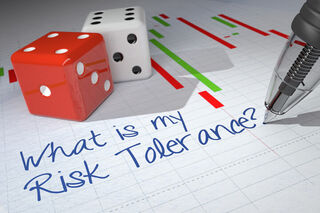Relationships
11 Causes of Irrational Risk Tolerance
Questions that can encourage a good balance.
Posted January 21, 2022 Reviewed by Kaja Perina
Key points
- Being aware of the causes of our level of risk tolerance can help us invest rationally.
- Parents and peers can make us unduly averse to or embracing of risk.
- It's often a mistake to try to use investing to moderate a tendency to be phlegmatic or high-energy.

A previous post examined risk tolerance in investing, relationships, work, health, and recreation.
Here we take a deeper look at risk tolerance in investing.
Financial advisors and apps ask clients to rate their risk tolerance, but usually they just accept the answer unquestioningly.
But it's important to know if the answer is irrationally high or low. If you can make your risk tolerance rational, you will likely achieve a better return on your investments while being able to sleep at night.
To become more rational, consider the extent to which the following are irrationally affecting your risk tolerance.
Your parent was very cautious and that paid off. For example, your parents spent the minimum, and every few months visited a website such as BankRate.com and invested only in the nation's then highest-yielding government-guaranteed CD. They always lived modestly but securely, and all worked out. Do you want to be that cautious? In your calculus, are you over-weighting their experience?
Your parent was very cautious and suffered as a result. For example, your parent stayed in a low-paying, unrewarding but secure job and the family lived too poor and, in retirement, went broke. Are you being too influenced by that small sample? If, for example, the Wise One within you thinks you should become a self-employed psychotherapist, should you not let your parent’s experience sway you?
Your parent took big risks and it paid off. For example, your parent risked lots of money on stocks and it paid off handsomely. True, the probability is that, at least in the long run, investing in stocks will yield a better return than, say, investing in Treasury Bills, but there will be volatility. For example, even if you spread the risk across stocks, for example, buying an S&P 500 fund, in a bad year, you could lose 10%, 20%, even more. Are you over-weighting your parents' successful risk-taking?
Your parent took big risks and suffered as a result. For example, your parent took a big mortgage to buy rental real estate and ended up with endless headaches and they lost money. Let’s say you’re considering a real estate investment. Rather than over-weighting your parent's experience, consider your temperament, time available, and importantly, how good the investment's risk/reward ratio seems to be, consulting an expert as needed. In light of that, is there a substantial risk you should be taking?
Your friend sang the praises of risky investment and it paid off. For example, your friend is a stock trader and says he’s making a great living. Although you know that only a tiny percentage of traders even break even let alone earn more than they otherwise could, you’re tempted. After all, you like adrenaline rushes, hate your job, and aren't very concerned that stock trading doesn't benefit society. Do you want to indulge or restrain that desire for extreme risk? Be honest with yourself.
Your friend sang the praises of risky investment and suffered as a result. For example, your friend bought Bitcoin at $60,000 and it’s now $40,000. You're surprised at how much that affected you—It's almost as if it was your own money. So you decided, perhaps unconsciously, to be very risk-averse in your investing. Too much so?
You’re a generally anxious person and choose ultra-safe investments such as CDs, which return very little but impose very little risk and no volatility. That cause of risk aversion may be less malleable than the previous ones. Should you honor your predisposition or try to change?
You’re a generally calm person and see risky investments as a way to get energized. Rationally, you know that making risky investments is an awfully expensive way to get energized. Do you want to find less expensive, safer, even potentially constructive ways to get an adrenaline rush? An example is to try to cram in as much work as you can before you need to stop. What do you want to do?
You feel pressure from yourself or your romantic partner to try to make big money fast. As you know, get-rich-quick schemes usually turn out to be get-poor schemes. That's because the risk of an investment is usually priced into it. For example, if a bond is yielding 10% in an era of 2% inflation, you can, ahem, bet that there’s a non-trivial chance that you'll lose much or even all of your money. Sure, you might reasonably opt for a moderate-risk investment such as an S&P-500 ETF, but think twice and do good homework before making a riskier investment.
You feel under pressure from yourself or your romantic partner to try to be ultra-conservative. As with the previous pressures, are you too heavily succumbing to that one? As usual, try to invoke the Wise One within you. What should you do?
The takeaway
These are mere examples. Of course, consider the particulars of your situation, not just your predisposition toward risk but, for example, your time horizon: If you think you’ll need a chunk of money in the next year or two, you’ll probably want to put that in a low- or no-risk investment rather than in, for example, stocks, because there aren’t years for the ups-and-downs to even out.
So, as you look at the aforementioned examples, do you want to adjust your risk tolerance?
Note that I am not a licensed financial advisor. I am a career and personal coach, and these thoughts are offered from that perspective. As they say, before making significant investment decisions, consider consulting a licensed financial advisor.
I read this aloud on YouTube.




